AFFORDABLE Valve Replacement Surgery in India - Indian Health Guru
Plan your Valve Replacement Surgery in India with Indian Healthguru Consultants
A valve replacement surgery includes replacing a damaged valve in your heart with a mechanical valve or a tissue valve. A new valve will relieve the strain and aims to ease symptoms such as breathlessness and chest pain. This surgery is complicated than most of the surgeries and only the best surgeon should be approached for your problem. Indian Healthguru Consultants is a medical value provider having network with the best hospitals and best heart valve surgeons in India.
How things function at Indian Healthguru Group:
- Basic facilities: Indian Healthguru helps in arrangement of medical visa, to and fro airport service, accommodation, meals, appointment with surgeon, lab tests etc.
- Qualified panel: Indian Healthguru has network of the best surgeons and hospitals, providing supreme healthcare in India.
- Affordable: The expenses incurred in the entire travel for heart valve replacement surgery in India are nearly 30% of that in most Western countries.
- Professionalism: We maintain highest ethics in providing the treatments and the procedures are followed with transparency.
- Other services: Our group also takes care of facilities like providing health meals as prescribed by your doctor, planning vacation in India, rejuvenation, rehab facilities.
Heart Valve Replacement Surgery in India
Vital Information 
 Phone / Whatsapp : +91-9371136499
Phone / Whatsapp : +91-9371136499
International Patient Experience
Mr. Nichoe
Kenya
 |
AWARDED AS THE BEST MEDICAL TRAVEL PROVIDER- YEAR 2022-23 |
 |
PATIENTS MANAGED- 230 approx / EVERY YEAR |
 |
PATIENT SATISFACTION- 97% |
 |
INTERNATIONAL MEDICAL CLINICS- AVERAGE 5 / YEAR |
 |
PERSONALISED APPROACH- 1 PATIENT MANAGER FOR EVERY 5 PATIENTS. |
What is Valve Replacement Surgery?
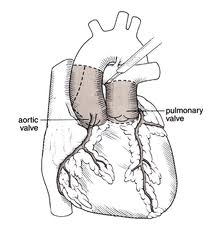 A valve replacement surgery (aortic valve surgery) is replacing a damaged valve in your heart with a mechanical valve (made from synthetic materials) or a tissue valve (usually taken from pig, cow, or human donors).
A valve replacement surgery (aortic valve surgery) is replacing a damaged valve in your heart with a mechanical valve (made from synthetic materials) or a tissue valve (usually taken from pig, cow, or human donors).
A new valve will relieve the strain and aims to ease symptoms such as breathlessness and chest pain due to angina.
Who is the Candidate for Valve Replacement Surgery?
As a general guide, however, you may be a candidate for valve replacement surgery for any of the following reasons:
- You have significant valve narrowing (stenosis) or leaking (regurgitation) that is causing severe cardiac symptoms, such as angina (chest pain), shortness of breath, syncope (fainting spells) or symptoms of heart failure.
- Although your cardiac symptoms are not yet severe, diagnostic tests show that you have valve stenosis or regurgitation that is beginning to seriously affect your heart function.
- You have milder valve stenosis or regurgitation, but you need open-heart surgery for another reason (such as coronary artery bypass). Your problematic heart valve can be replaced during this open heart procedure, correcting the situation before it has the chance to deteriorate.
- Your heart valve has been damaged severely by endocarditis (infection of the heart valve), or you have endocarditis that is resistant to antibiotics.
- You already have a prosthetic heart valve, but it needs to be replaced because it is leaking or malfunctioning, because you are having recurring blood clots or infection on the heart valve, or because you are having bleeding problems related to anticoagulants.
Valve Replacement Surgery Cost in India
The heart valve replacement surgery in India cost typically ranges from Rs. 2,80,000 ($3,500) to 5,60,000 ($7,000), with some procedures like minimally invasive transcatheter mitral valve replacement (TAVR) costing between Rs. 12,00,000 ($16,000) to 24,00,000 ($30,000). Costs vary significantly based on the type of valve, the surgical method, the hospital, and the city.
Estimated Valve Replacement Surgery Costs By Type
You can go for Valve replacement surgery in India in following cities:
| Procedure | Description | Estimated Cost (₹) |
| Aortic Valve Replacement (AVR) | Involves replacing the aortic valve, often through open-heart surgery. A minimally invasive option is also available. | ₹2,50,000–₹6,00,000 |
| Mitral Valve Replacement (MVR) | Involves replacing the mitral valve, a procedure that can be performed via traditional open-heart or minimally invasive surgery. | ₹2,00,000–₹5,00,000 |
| Double Valve Replacement (DVR) | A more complex procedure that involves replacing two heart valves, typically the aortic and mitral valves. | ₹6,67,000–₹11,50,000 |
| Tricuspid Valve Replacement | Replaces the tricuspid valve. | ₹4,82,000–₹5,46,000 |
| Transcatheter Aortic Valve Replacement (TAVR) | A minimally invasive procedure for high-risk patients that inserts a new valve via a catheter. | ₹12,00,000–₹24,00,000 |
Factors Affecting the Cost of Valve Replacement Surgery in India
You can go for Valve replacement surgery in India in following cities:
- Surgical technique: Minimally invasive and robotic-assisted surgeries are more expensive due to advanced technology and specialized skills.
- Hospital and city: Costs are typically higher in private hospitals in major metropolitan areas compared to smaller hospitals or cities.
- Patient health: A patient's overall health and the presence of any comorbidities can influence the complexity and duration of the surgery, impacting the overall cost.
- Pre- and post-operative care: This includes the cost of diagnostic tests, medication, and rehabilitation, which can increase the total expense.
Best Hospitals for Heart Valve Replacement Surgery in India
The best hospitals for heart valve replacement surgery in India provides great value proposition for patients looking for low costs valve replacement surgery in India.
Our network of hospitals have modern infrastructure and facilities, the top heart valve surgeons in India uses the most advanced minimally invasive heart valve replacement surgery techniques for our patients. The hospitals are located at Mumbai, Delhi, Pune, Jaipur, Chandigarh, Goa, Kochi, Gurgaon, Noida, Hyderabad, Bangalore, Chennai, Nagpur, Ahmedabad, Kerala, etc.
What is the Diagnosis for Valve Replacement Surgery?
The following tests may be done to conclude and diagnose valve diseases 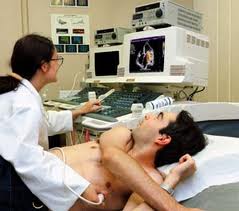
- Echocardiography
- Transesophageal echocardiography
- Cardiac catheterization (also called an angiogram)
- Radionuclide scans
- Magnetic resonance imaging (MRI)
During a physical examination, the doctor will listen to your heart to hear the sounds the heart makes as the valves open and close. A murmur is a swishing sound made by blood flowing through a steno tic or leaky valve.
What are the Types of Valve used for Valve Replacement Surgery?
- Mechanical valves Mechanical valves are designed to outlast the patient, and have typically been stress-tested to last several hundred years. Although mechanical valves are long-lasting and generally only one surgery is needed, there is an increased risk of blood clots forming with mechanical valves. As a result, mechanical valve recipients must generally take anti-coagulant drugs such as Warfarin for the rest of their lives, which makes the patient more prone to bleeding.
-
Tissue valves
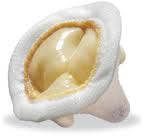 Tissue heart valves are usually made from animal tissues, either animal heart valve tissue or animal pericardial tissue. The tissue is treated to prevent rejection and calcification.
Tissue heart valves are usually made from animal tissues, either animal heart valve tissue or animal pericardial tissue. The tissue is treated to prevent rejection and calcification.
There are alternatives to animal tissue valves. In some cases, a homograft - a human aortic valve - can be implanted. Homograft valves are donated by patients and harvested after the patient dies. The durability of homograft valves is probably the same for porcine tissue valves. Another procedure for aortic valve replacement is the Ross procedure. In a Ross procedure, the aortic valve is removed and replaced with the patient's own pulmonary valve. A pulmonary homograft (pulmonary valve taken from a cadaver)is then used to replace the patient's own pulmonary valve. This procedure was first used in 1967 and is used primarily in children
-
Homograft
A homograft or allograft is a human valve obtained from a donor. This type of valve is particularly beneficial for pregnant women and children, because it does not require long-term anticoagulation therapy. In addition, it can provide excellent hemodynamic performance, allowing for natural function of the surrounding structures. Because the availability of these valves depends on donors, supply is limited.
What is the Preparations for Valve Replacement Surgery?
- Your physician may perform a complete physical examination to ensure you are in good health before undergoing the procedure. You may undergo blood tests or other diagnostic tests.
- You will be asked to fast for eight hours before the procedure, generally after midnight.
- If you are pregnant or suspect that you are pregnant, you should notify your physician.
- Notify your physician if you are sensitive to or are allergic to any medications, iodine, latex, tape, or anesthetic agents (local and general).
- Notify your physician of all medications (prescription and over-the-counter) and herbal supplements that you are taking.
- Notify your physician if you have a history of bleeding disorders or if you are taking any anticoagulant (blood-thinning) medications, aspirin, or other medications that affect blood clotting. It may be necessary for you to stop some of these medications prior to the procedure.
- Notify your physician if you have a pacemaker.
- If you smoke, you should stop smoking as soon as possible prior to the procedure. This may improve your chances for a successful recovery from surgery and benefit your overall health status.
Phone Numbers Reach Us-
India & International : +91-9860755000 / +91-9371136499
Email : contact@indianhealthguru.com
What is the Procedure for Valve Replacement Surgery?
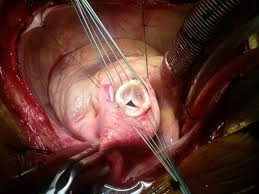
- You will be positioned on the operating table, lying on your back.
- The anesthesiologist will continuously monitor your heart rate, blood pressure, breathing, and blood oxygen level during the surgery. Once you are sedated, a breathing tube will be inserted through your throat into your lungs and you will be connected to a ventilator, which will breathe for you during the surgery.
- A catheter will be inserted into your bladder to drain urine.
- The skin over the surgical site will be cleansed with an antiseptic solution.
- The physician will make an incision (cut) down the center of the chest from just below the Adam's apple to just above the navel.
- The sternum (breastbone) will be divided in half with a special operating instrument. The physician will separates the two halves of the breastbone and spread them apart to expose the heart.
- In order to perform the valve repair or replacement, the heart must be stopped to allow the physician to perform the very delicate procedure. Tubes will be inserted into the heart so that the blood can be pumped through your body by a cardiopulmonary bypass machine.
- Once the blood has been completely diverted into the bypass machine for pumping, the heart will be stopped by injecting it with a cold solution.
- When the heart has stopped, the physician will perform the procedure by removing the diseased valve and putting in the artificial valve, in the case of a valve replacement. For a valve repair, the procedure performed will depend on the type of valve problem that exists, e.g., separation of fused valve leaflets, repair of torn leaflets, and/or the reshaping of valve parts to ensure better function.
- Once the procedure has completed, the blood circulating through the bypass machine will let back into your heart and the tubes to the machine removed. Your heart will be shocked with small paddles to restart the heartbeat.
- Once your heart is beating again, the physician will observe the heart to assess the function of the heart and the valves.
- Temporary wires for pacing may be inserted into the heart. These wires can be attached to a pacemaker and your heart can be paced, if needed, during the initial recovery period.
- The sternum will be rejoined and sewn together with small wires.
- The skin over the sternum will be sewn back together. The incision will be closed with sutures or surgical staples.
- Tubes will be inserted into your chest to drain blood and other fluids from around the heart. These tubes will be connected to a suction device to drain fluids away from the heart.
- A tube will be inserted through your mouth or nose into your stomach to drain stomach fluids.
- A sterile bandage/dressing will be applied.
How is the Recovery after Valve Replacement Surgery?
The patient will be in an intensive care unit for the first 2 or 3 days following the surgery and the heart functions will be monitored constantly. The average hospital stay is 1 - 2 weeks. A total recovery will take a few weeks to several months, depending on previous health and age of the patient.
What are the Advantages of Valve Replacement Surgery? 
- Improved quality of life
- Prolonged life
- Reduced symptoms
What are the Risks of Valve Replacement Surgery?
Once you’ve had heart valve surgery, you’ll have an increased risk of developing an infection of the valve. This is known as endocarditis. As a precaution, you will need to take antibiotics before undergoing some dental or surgical procedures. In most cases, we will also prescribe an anticoagulant medication to prevent blood clots.
What are the Alternatives to Valve Replacement Surgery?
Alternatives to Valve replacement surgery includes taking prescription medications to improve the effectiveness of each heartbeat, remove excess fluids, and control blood pressure. These medications only treat the symptoms associated with valve problems; they do not address the cause of them. Other alternatives to valve replacement surgery include an invasive procedure known as percutaneous balloon valvuloplasty.
Why consider India for Valve Replacement Surgery?
- India has become the healthcare hub for international patients as it provides with the latest in medical treatment facilities and best services making it easy and comfortable.
- Extensive investments have been made to ensure that all medical centers are equipped with modern facilities; internationally accredited hospitals of India are capable of handling the latest techniques and procedures. These state-of-the-art facilities focus on what matters: more effective, efficient and pleasant solutions for patients.
-
 India boasts volumes of its excellently maintained healthcare providers by stringent government controls on the policies for control of promotion and advertisement, thus not visible much in news papers, magazines and electronic media. But certainly as good as other regional healthcare providers like Singapore and Thailand.
India boasts volumes of its excellently maintained healthcare providers by stringent government controls on the policies for control of promotion and advertisement, thus not visible much in news papers, magazines and electronic media. But certainly as good as other regional healthcare providers like Singapore and Thailand.
- The Indian government has made it easier for visitors seeking health treatments to enter the country. With the relevant letter from the medical centre at which you will be receiving your medical treatment, you may enjoy up to six months of visa extension.
You can go for Valve replacement surgery in India in following cities:
| Mumbai | Hyderabad | Kerala |
| Delhi | Pune | Goa |
| Bangalore | Nagpur | Jaipur |
| Chennai | Gurgaon | Chandigarh |
| India | US | UK |
|---|---|---|
| $3,500-$7,000 | $16,000-$18,000 | $18,000-$20,000 |
Mr. Jerome Acquah from Ghana shares his experience of getting his Father’s Valve Replacement Surgery done in India
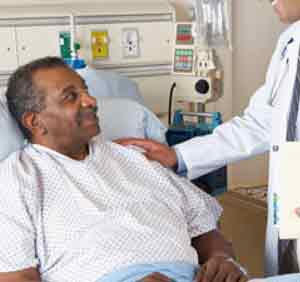
Mr. Jerome Acquah
Ghana
★★★★★ Published
Why plan Valve Replacement Surgery in India with Indian Healthguru Group?
- Indian Healthguru is a leading medical value provider for Valve replacement surgery in India.
- We are affiliated with reputed hospitals capable of offering specialized treatments, overseen by prominent and renowned medical teams. We provide treatment for a vast range of illnesses and surgery including Cardiac, Orthopedic, Pediatrics, Cosmetic Surgery, Ayurveda, and Interventional procedures.
- Indian Healthguru specializes in providing affordable medical care and treatment packages to patients in the other countries. We improve lives by offering people, alternative options in healthcare treatment. Every client is given individual attention to every single minor detail and extensive efforts to ensure his/her satisfaction. We have our clients from USA, Canada, UK, Australia, Europe, Middle East etc.
- To have a free consultation with Indian Healthguru Group regarding Valve replacement surgery in India, you just have to send us a query regarding your treatment and within 24 hours, a patient coordinator will contact you for further details and interaction.
- From that point, that patient coordinator will take care of all your proceedings like arranging VISA, accommodation, appointment with the doctor with round the clock services to make your medical tour hassle free.
- DoesVentricular Septal Defect (VSD) Surgery Cost in India promise successful treatment?
- Like any other surgery, there is never a 100% guarantee for success. However, Valve Replacement Surgery in India is performed by experts using latest infrastructure, with maximum rate of success.
- Does successful valve replacement surgery in India impact on your healthy heart life?
- A valve replacement surgery does only good to the heart, keeping it healthy and normal.
- How long does a replaced heart valve last?
- Tissue valves wear out slowly, much like natural valves. Your age and health play a large part in how long your valve will last. Usually, they 7 to 15 years, but can last more than 20 years. The amount of time depends on many complex patient factors that should be discussed with your doctor.
- How much can I really save?
- The expenses involved in Valve replacement surgery in India ar nearly 25% of that in majority of Western countries. So that means a lot of savings!
- Can I choose my own hotels according to my budget?
- You can most definitely choose hotels as found convenient to you and your budget.
Phone Numbers Reach Us-
India & International : +91-9860755000 / +91-9371136499
Email : contact@indianhealthguru.com
Some of the common countries from which patients travel to India for surgery are:
| USA | UK | Canada |
| Australia | New Zealand | Nigeria |
| Kenya | Ethiopia | Uganda |
| Tanzania | Zambia | Congo |
| Sri Lanka | Bangladesh | Pakistan |
| Afghanistan | Nepal | Uzbekistan |
Below are the downloadable links that will help you to plan your medical trip to India in a more organized and better way. Attached word and pdf files gives information that will help you to know India more and make your trip to India easy and memorable one.
| Click icon to Download Document | ||||||
| About India | Destinations in India | |||||
| Indian Embassy List | Medical Tourism FAQ | |||||
| Visa For India | ||||||
 Apollo Hospital
Apollo Hospital Fortis Hospital
Fortis Hospital Artemis Hospital
Artemis Hospital Max Hospital
Max Hospital Columbia Asia Hospital
Columbia Asia Hospital Nova Hospital
Nova Hospital Medanta Hospital
Medanta Hospital



 Jaslok Hospital
Jaslok Hospital Lilavati Hospital
Lilavati Hospital

 Global Hospitals
Global Hospitals